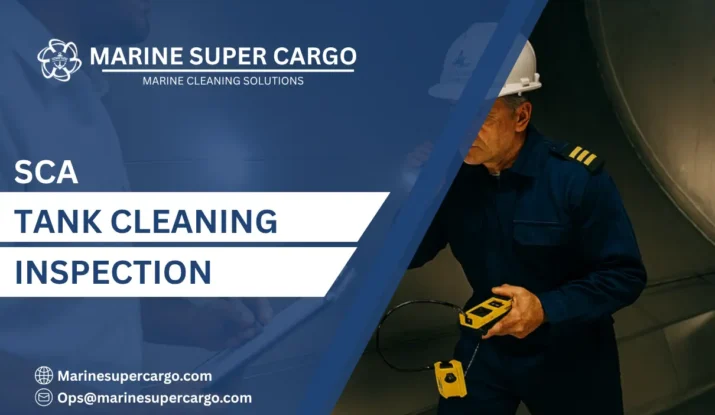Navigating SCA Tank Cleaning Inspection Protocols
The Suez Canal Authority enforces rigorous SCA tank cleaning inspection procedures to protect the canal environment and ensure vessel safety during transit. Understanding these protocols is crucial for operators transporting petroleum products, chemicals, or hazardous materials through this vital maritime corridor.
Marine Super Cargo specializes in preparing vessels for seamless SCA tank cleaning inspection processes. Our expertise ensures your tanker meets every regulatory requirement before anchoring at Port Said or Suez approaches, eliminating costly delays and compliance issues.
SCA tank cleaning inspection procedures align with International Maritime Organization (IMO) standards while incorporating specific canal authority requirements. These inspections verify that cargo tanks meet environmental protection standards before vessels enter the waterway.
Pre-Inspection Documentation Requirements
Before SCA tank cleaning inspection commences, inspectors review comprehensive documentation packages. Your vessel must present current Oil Record Books, Cargo Record Books, and tank cleaning logbooks with complete entries covering recent operations.
Marine Super Cargo ensures all documentation meets SCA standards through our comprehensive tank cleaning services. Certificates of inspection from previous ports, gas-free certificates, and slop discharge receipts must be readily available for inspector verification.
SCA inspectors scrutinize entries detailing cleaning operations performed on port and starboard cargo tanks. They verify timestamps, officer signatures, and consistency between logbook records and actual tank conditions observed during physical inspection.

Physical Tank Inspection Process
During SCA tank cleaning inspection, authority personnel access designated cargo tanks to assess cleanliness standards. Inspectors examine tank bulkheads, deck heads, and bottom plating for residue accumulation that could pose environmental risks during canal passage.
The inspection team uses portable gas detection equipment to verify atmosphere safety levels within cargo spaces. Tanks must demonstrate oxygen content, hydrocarbon vapor concentrations, and toxic gas readings within acceptable MARPOL Annex I and Annex II parameters.
Marine Super Cargo prepares vessels for these physical examinations by conducting thorough pre-inspection cleaning of all cargo tanks. Our procedures ensure inspectors find no residues on longitudinal bulkheads, transverse frames, or tank bottom plating during their examination.
MARPOL Compliance Verification
SCA tank cleaning inspection procedures heavily emphasize MARPOL regulation adherence. Inspectors verify that vessels carrying noxious liquid substances comply with prewash requirements before entering canal waters.
Chemical tankers face particularly stringent scrutiny regarding cargo residue management. SCA inspectors confirm that Category X, Y, and Z substances were properly discharged to reception facilities, with supporting documentation from approved shore installations.

Common Inspection Failure Points
Understanding why vessels fail SCA tank cleaning inspection helps operators avoid these pitfalls. Residue accumulation around heating coils, in tank corners near the bow or stern sections, and along stiffener connections frequently causes inspection holds.
Missing or incomplete discharge receipts from shore facilities cause immediate compliance concerns. Marine Super Cargo emphasizes obtaining proper documentation for every residue transfer, following our established tank cleaning best practices.
Inspection Timeline and Boarding Procedures
SCA tank cleaning inspection typically occurs within 2-4 hours of vessel arrival at canal anchorage. The inspection launch approaches your vessel’s port or starboard accommodation ladder, depending on anchoring configuration and prevailing conditions.
Marine Super Cargo recommends designating specific crew members for inspector liaison duties, ensuring smooth communication throughout the SCA tank cleaning inspection process.
Remedial Actions for Non-Compliance
Vessels failing initial SCA tank cleaning inspection receive detention notices specifying deficiencies requiring correction. Common remedial actions include additional tank washing, extended ventilation periods, or arranging shore-based cleaning services at canal anchorage.
Marine Super Cargo maintains rapid response capabilities for vessels requiring emergency cleaning services during Suez Canal approach. Our mobile teams can board at anchorage to address inspector concerns and expedite transit clearance.
Seasonal and Regional Considerations
Environmental conditions affect SCA tank cleaning inspection procedures throughout the year. Summer months bring elevated temperatures that can accelerate cargo residue solidification, making thorough cleaning more challenging before inspection.
Vessels arriving from specific load ports face enhanced scrutiny based on historical compliance patterns. SCA maintains databases tracking vessel performance, with previous inspection results influencing current examination intensity and focus areas.
Frequently Asked Questions
Q1: How long does a typical SCA tank cleaning inspection take?
Standard inspections require 2-4 hours from boarding to completion, though vessels with compliance concerns may face extended examination periods lasting 6-8 hours.
Q2: Can vessels transit Suez Canal without tank cleaning inspection?
No, all tankers carrying petroleum products, chemicals, or hazardous materials must undergo SCA inspection before receiving transit clearance through the canal.
Q3: What documentation must be immediately available during SCA inspection?
Oil Record Books, Cargo Record Books, tank cleaning logbooks, gas-free certificates, and discharge receipts from shore facilities must be presented to inspectors.
Q4: Does Marine Super Cargo provide emergency cleaning services at Suez anchorage?
Super Cargo maintains rapid response teams capable of boarding vessels at canal anchorage to address inspection deficiencies and expedite compliance.
Q5: How often do vessels fail initial SCA tank cleaning inspections?
Approximately 15-20% of tankers face detention for cleaning deficiencies, primarily due to inadequate documentation or residue accumulation in cargo tanks.


